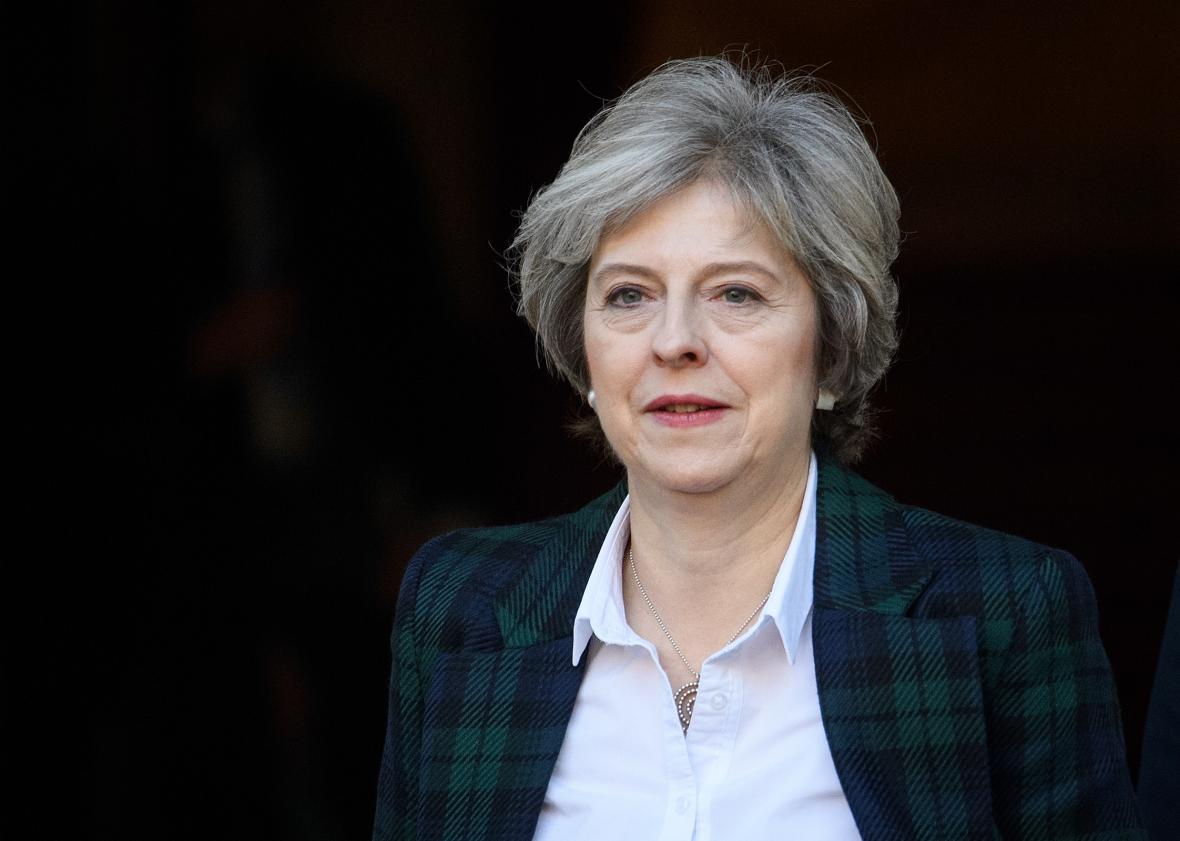“Brexit means Brexit” has been the mantra of Theresa May’s government for months, as observers have speculated about whether she would try to find some way of keeping most of the elements of EU membership in place. Judging by her speech Tuesday, she really did mean it.
While the signs had not been promising, some had still hoped for a “soft Brexit” scenario in which Britain would remain in the European common market in exchange for giving up some control over immigration and comply with EU legislation—the deal that Norway currently has. But May said in her speech Tuesday that the U.K. would be pulling out of the common market, as staying in it would mean “not leaving the EU at all.”
May said she plans to negotiate the “freest possible trade” agreement with the EU and new agreements with countries outside the EU. She plans to trigger Article 50, the mechanism by which countries withdraw from the EU, in March. After that, there will be two years to negotiate an exit agreement, and—in theory anyway—no turning back. May also said that the final exit deal negotiated with the EU would be put to Parliament for a vote, and if there were no satisfactory deal on offer, Britain would simply pull out without one.
May said she was “confident that a positive agreement can be reached,” but there’s some reason for concern. Negotiating new trade deals can be a lengthy slog, even under the best of circumstances. A recent EU-Canada deal took seven years to negotiate and was very nearly scuttled at the last minute thanks to opposition from the Belgian region of Wallonia. It’s going to be even harder when the parties are going into it with as much bitterness as we see now. One German member of the European Parliament characterized May’s message as “Go fuck yourself EU.” Other EU leaders used different language to make basically the same point. There’s little appetite to make this easy for Britain.
May faces problems at home as well. Scottish First Minister Nicola Sturgeon suggested Tuesday that May’s speech had made a new referendum on Scottish independence more likely. Northern Ireland is also holding snap elections in March, amid concerns, particularly among Catholic voters, that Brexit will mean the reimposition of security and customs checkpoints along the border with the Republic of Ireland—the U.K.’s only land border with the EU. May made a point in her speech Tuesday of saying she would seek to secure free movement between the U.K. and Ireland, though this would seem to be in contradiction with the main point of Brexit: giving Britain more control over who crosses its borders.
There are also concerns for what will happen to the 3 million EU citizens in the U.K., and 1.2 million British citizens living in Europe. May said in the speech she would seek to preserve their rights and interests, but it also seems possible their status could be used as a bargaining chip in negotiations. (Facing criticism that she has not been transparent enough about the government’s negotiating position, May said Tuesday that the public should not expect a “blow-by-blow” account of negotiations as they progress.)
A tough fight with Parliament may also loom, now that May has conceded that it will get a say on the final deal. The majority of MPs opposed Brexit. Many of them are likely to support the deal, rather than go against the views of their constituents, but if public opinion shifts, they will be able to make the case that the full break with Europe that May is now proposing is not what the British public thought they were supporting. As Liberal Democrat leader Tim Farron put it, “Hard Brexit was never on the ballot paper. Ripping us out of the single market was not something proposed to the British people. This is a theft of democracy.” Jeremy Corbyn, leader of the Labour Party, said May appeared to be trying to “turn Britain into a bargain basement tax haven on the shores of Europe.”
On the other hand, Paul Nuttall, the new leader of the pro-Brexit U.K. Independence Party, gave the speech a “7 out of 10,” and said it “did sound like a UKIP conference speech” at times. That Britain’s most stridently anti-EU party is now essentially satisfied with May is a pretty remarkable turnaround, considering that before last summer she opposed Brexit altogether.
May’s speech came just after U.S. President-elect Donald Trump praised Britain as “so smart” for exiting the EU, which he said had become a “vehicle for Germany.” May will likely welcome Trump’s pledge to quickly negotiate a new trade deal between the United States and Britain—Barack Obama hadn’t been so enthusiastic—but she also seemed to be distancing herself from Trump’s catastrophic views of the EU, saying a complete unraveling of the union “would not be in the best interests of Britain.”
